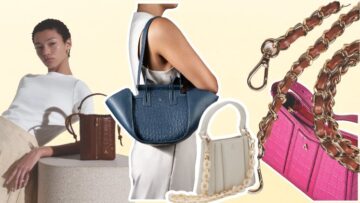For a long time, brands followed standard return policies—typically offering free returns within 15 to 30 days and full refunds to the original payment method. However, this is gradually changing, as rising return rates are prompting brands to experiment with new return strategies.
According to Return Prime, 17.6% of all e-commerce orders get returned, but in categories such as fashion and footwear, it can go as high as 30-35%. As per the report, more than 40% of items are returned due to size issues— both in apparel and in footwear. This is followed by discrepancies between the product and its description if the item is damaged or defective and other factors such as change of mind, impulse purchases or receiving the wrong item.
By 2025, brands may face revenue losses of approximately US $ 20-30 billion due to product returns, with return rates potentially reaching 40% as e-commerce extends deeper into India’s rural and remote regions.
India’s online retail sector is on track to surpass US $ 160 billion in value by 2028. Following the pandemic, the industry has witnessed robust expansion, reaching an estimated US $ 57-60 billion in 2023—reflecting an annual growth of US $ 8-12 billion since 2020. Despite this momentum, online purchases still make up only 5-6% of total retail spending in India, compared to 23-24% in the United States and 35% in China. This suggests considerable room for further growth, according to a report by Bain & Company in partnership with Flipkart.
| 40% To prevent ‘serial offenders’ from misusing the return feature, brands like Global Desi and AND— both from the House of Anita Dongre— have an interesting return policy–only 40% of all orders placed can be returned. |
While most brands still offer free returns, some have begun charging return fees to offset the costs of processing and reselling items, which include shipping, packaging, labour and potential depreciation. High return rates and practices like ‘bracketing’— where customers buy multiple items intending to return most—have turned return logistics into a major expense for retailers. Additionally, some brands believe that introducing return fees can help raise consumer awareness about the environmental and financial impact of frequent returns.
We did some in-depth digging and analysed nearly 50 brands across categories and price points which discourage returning products through various means such as charging return fee, giving only store credits, imposing return limits and prohibiting returns on custom-made items.
PAY TO RETURN
One of the biggest retailers in India, the Japanese fashion giant UNIQLO charges Rs. 50 return shipping fee that is non-refundable. Like most brands that don’t take returns for innerwear and swimwear due to hygiene purposes, UNIQLO has babywear as a non-returnable item too.
Many D2C brands also demand a return shipping fee to handle operational costs. These include Almost Gods (Rs.100), Snitch (Rs.100 per item), Offduty India (Rs.150), NorBlack NorWhite, Summer Away, Cin Cin, The Getaway Clothing (7 per cent of total order cost) and Campus Sutra (Rs.100).
Similarly, traditional ethnicwear labels such as Bunaai and The Loom charge return shipping fees of Rs. 250 and Rs.100 respectively. Bunaai also bills a fee of Rs. 300 for size exchanges on discounted items, provided the requested size is available.
Meanwhile, sustainable brands like Sage By Mala and Doodlage are doing the same, with both labels exacting a fee of Rs.150 to promote their eco-friendly initiatives and encourage more conscious shopping habits. For items purchased using a gift card, Sage By Mala allows only one size exchange with a charge of Rs.150. Doodlage, on the other hand, does not offer reverse pick-ups, requiring the customer to bear the full responsibility and cost of returning items.
ONLY STORE CREDIT
Some are exclusively giving only store credit to encourage repeat business and retain revenue. The store credit policy incentivises customers to shop again— increasing the likelihood of future sales and bolstering cash flow.
Niche westernwear brands like Urban Suburban, No Labels, ANI Clothing, The House of Rare and FEMMELLA only give refunds as store credit, with No Labels also deducting Rs. 250 to cover logistics cost.
In a similar vein, streetwear brands like Capsul and Jaywalking issue refunds only as store credit. Jaywalking further requires customers to handle return shipping themselves, bearing the full cost.
HUEMN, another D2C brand, stood out in this regard as it only offers exchanges or credit notes and no refunds. This helps manage inventory, reduce operational costs and fosters customer loyalty.
Spykar, a casualwear brand, only provides store credit for cash-on-delivery (COD) orders. However, its counterparts such as Mufti Jeans, Pepe Jeans and Killer Jeans offer monetary refund upon return of selected items. In addition, Mufti Jeans does not have an exchange policy and a new order needs to be placed.
Pantaloons, a prominent retailer under the Aditya Birla Fashion and Retail Ltd. (ABFRL), also provides only store credit for COD orders, whereas its competitors such as Westside and Reliance Trends offer both store credit and monetary refund upon return. Jaypore, an ethnicwear brand, also under ABFRL, has a similar store credit policy like Pantaloons.
THRESHOLD ON RETURNS
To prevent ‘serial offenders’ from misusing the return feature, brands like Global Desi and AND— both from the House of Anita Dongre—have an interesting return policy– only 40% of all orders placed can be returned. In cases where the returns shall exceed 40% of the total orders, their system shall automatically block the returns tab on your account and no further requests shall be processed until the return quantum is back within the limit. Meanwhile, Reebok, the sportswear and footwear brand, offers more leniency, allowing returns on up to 90% of all orders placed. Its competitors such as Nike, Adidas and Puma have no such return limits.
| Returns With Shipping Fee | |
| UNIQLO | Westernwear |
| Mufti | Denimwear |
| Meena Bazaar | Traditional |
| Cantabil | Westernwear |
| Cider | Westernwear |
| Sage By Mala | Sustainable |
| Doodlage | Sustainable |
| The Loom | Traditional |
| Bunaai | Traditional |
| Almost Gods | Menswear |
| Snitch | Menswear |
| Offduty India | Westernwear |
| NorBlack NorWhite | Womenswear |
| Campus Sutra | Menswear |
| The Getaway Clothing | Womenswear |
| Return Limit Capped | |
| Global Desi | Ethnicwear |
| AND | Westernwear |
| Reebok | Sportswear |
NO RETURN ON PERSONALISED PRODUCTS
In order to save cost of personalisation of products, formalwear brands like Peter England and Louis Phillipe take no returns for customised items. Since personalised products are uniquely crafted to customer specifications, they are not eligible for exchange too, unless there is a manufacturing defect. Custom-made items are unique and may not appeal to other customers, making it challenging to recover the investment from returned items. Meanwhile, Allen Solly and Park Avenue don’t have such limitations on returns.
Premium sportswear brands Adidas and Puma also do not offer returns on customised products until and unless there is a defect in the product. Reebok, on the other hand, does not offer exchange on customised items. Whereas, Nike offers returns on customised products like ‘Nike By You’ sneakers.
Adding to this, westernwear brands like Qua Clothing and FableStreet do not give returns or exchanges on customised items. For the latter, only alteration can be provided on a case to case basis, a request for which needs to be raised within seven days of receipt of the product.
Beyond these measures, a broader strategy is emerging to mitigate returns. For instance, there’s been a strong shift towards using technology to improve the initial purchase experience such as advanced AI-powered sizing tools that drastically cut down on fit-related returns. The adoption of virtual try-ons and augmented reality (AR) is also critical, bridging the gap between digital presentation and physical reality, which boosts customer confidence and reduces returns stemming from unmet expectations.
Furthermore, 3D product visualisation and videos are being used to provide highly accurate depictions of fit, drape and texture.
There’s also a strong focus on enhancing product information and imagery. This involves providing meticulously detailed product descriptions that go beyond basic specifications, along with accurate and specific sizing guides.
Additionally, brands are leveraging customer reviews that include visuals, allowing prospective buyers to benefit from peer experiences and make more informed decisions.
| No Return On Custom Orders | |
| Peter England | Formalwear |
| Louis Phillipe | Formalwear |
| Pepe Jeans | Denimwear |
| Adidas | Sportswear |
| Puma | Sportswear |
| FableStreet | Westernwear |
| Qua Clothing | Westernwear |
| Trendia | Traditional |
| Exchange Only | |
| HUEMN | Westernwear |
| Cin Cin | Westernwear |
| Exchange Or Store Credit | |
| ANI Clothing | Westernwear |
| FEMMELLA | Westernwear |
| Lea Clothing Co. | Sustainable |
| Suta | Traditional |
| Store Credit + Return Fee | |
| Old Marigold | Sustainable |
| Jaywalking | Streetwear |
| Summer Away | Womenswear |
| Store Credit | |
| Urban Suburban | Westernwear |
| The House of Rare | Westernwear |
| Nicobar | Sustainable |
| Capsul | Streetwear |
| Six5Six | Activewear |
| No Labels | Westernwear |
| COD Refunds As Store Credit | |
| Pantaloons | Westernwear |
| Spykar | Denimwear |
| Jaypore | Traditional |








